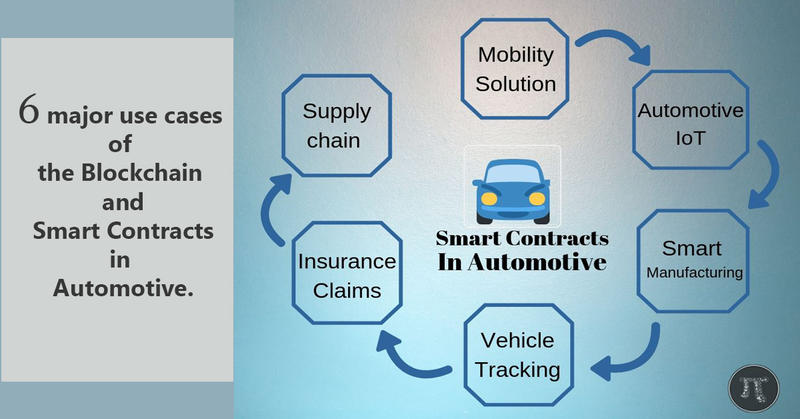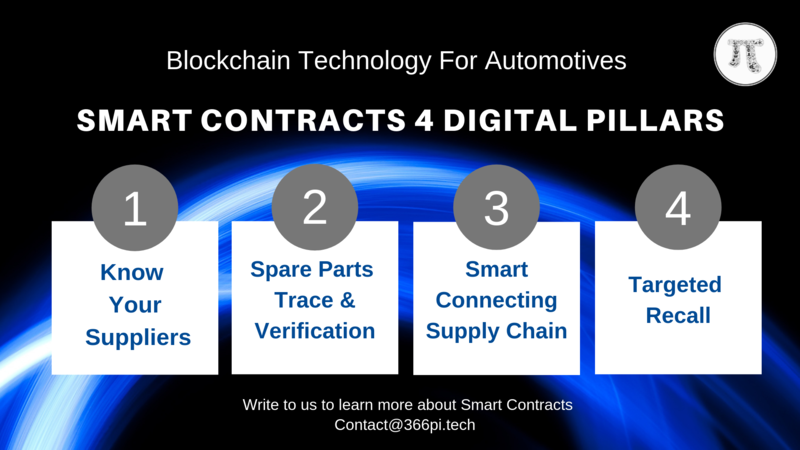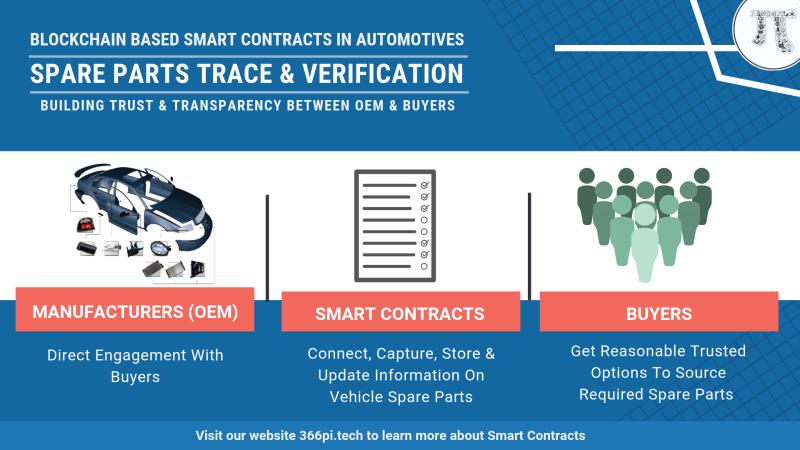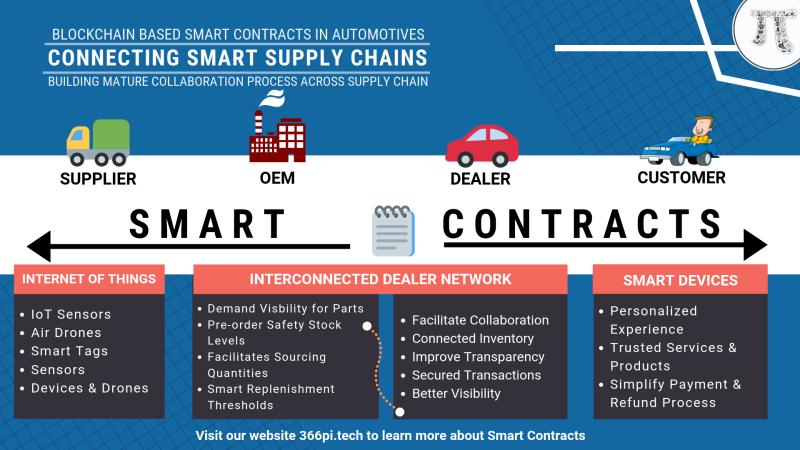The answer to some of the most pressing automotive issues lies in adopting the right technology, especially blockchain. A piece of an automobile is as good as the person behind the driving seat. In the case of technology, it’s blockchain in the driving seat that’s transforming the rules of the game.
One simple use-case is enabling #smartcontracts across the automobile manufacturing process. Our staking based feature further enhances the potential of the smart contracts for the automobile manufacturer. What you gain is supply chain efficiency, trust, and transparency.
Blockchain technology, which has already disrupted the financial services and supply chain industries, has at last arrived in the auto industry.Automotive industry is changing and blockchain smart contracts will make a significant impact on that change.
“Cars are not just vehicles for mode of transport. They are technology on wheels enabling connectivity.”
Blockchain has impacted every vertical and domain of the industry and no wonder automobile has also been influenced.
Original Equipment Manufacturers (OEM) are pushing on connected cars. Real-time monitoring, auditability, and scalability are the key factors favoring blockchain technology to be used for connected cars, cybersecurity, and autonomous vehicles. Mobility, supply chain logistics, retailing, and leasing are some of the automotive key functional areas implementing or prototyping on blockchain applications. Smart manufacturing, connected living, IoT and connected insurance are some of the future automotive functional areas that can be leveraged based on blockchain technology.
Smart Contracts for the automotive industry can be deployed for improved streamlined operations across the supply chain. Motor parts sourced from different suppliers could be lost in delivery, stolen, replaced, damaged, etc.
With digital tech, supply chains in the automotive industry can easily address challenges such as
- Lack of Transparency, and
- Inefficient Processes of the supply chain
The tracking of spare parts from its point of origin to the vehicle is a chain of complex IT processes. Even with such systems in place, the likelihood of your purchase of spare parts or items, it’s difficult to track its history from the point of its origin.
In short, it’s hard problem to solve. The credibility of the brand is at stake because of fake spare parts and inefficient supply chains. Automotive businesses globally spend a huge amount of money and time on third-party verification to protect themselves from fake motor parts. This makes the entire process expensive, slow and unreliable due to manual intervention.
Blockchain and Smart contracts have the potential to strengthen trust across all the parties in the supply chain; making it
- transparent
- secure and
- saving time + money for all stakeholders
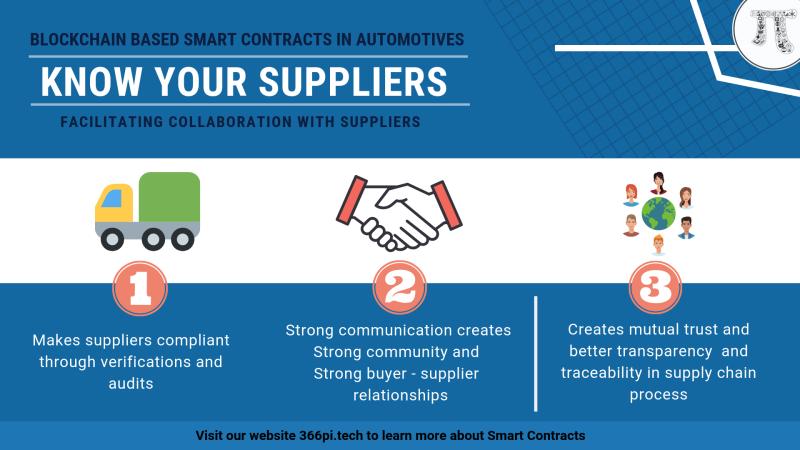
Smart Contracts on Blockchain can create stronger buyer-supplier relationships through compliance and communication.The smart contracts on blockchain facilitates decentralized digital infrastructure collaboration between buyer and supplier. The blockchain smart contracts makes audit and verification easy and transparent. The smart contracts based system, therefore, creates strong community of suppliers and buyer.
The smart contracts leverage existing IT systems and can be deployed with minor enhancements to existing Infrastructure. With such smart contract in place, it’s easy to achieve Compliance to Standard business operating practices.
Ready-to-Use canned smart contracts enables business and functional leaders to rapidly “Define-Design-Deploy” blockchain contracts for existing supplier-process easily. Interested?
Will you order replacement brake pads with an unknown automotive manufacturer? May be not.
But, what made you consider this option at the first place?
- The reasonable price Or/And
- Instant Availability
With change in the vehicle technology itself – there are far less spare parts needed to be replaced than before. Electric Vehicles and Cars of future will have less spare parts to maintain, replace, or repair with longer service intervals.
OEMs are experiencing the paradigm shift in their business model. They are continuously simplifying the complexity of engaging customers directly. Customers on the other hand are on the lookout for better “reasonable” options for meeting their spare parts needs.
Smart Contract based solution connect, capture, store and update information on vehicle spare parts facilitating sales with complete trust and transparency. Automotive manufacturers brings different service centers, car manufacturers, logistics and customer to trace and track the origin of spare parts through the supply chain. The decentralization capabilities of blockchain further enables these manufacturer to simplify logistics and operations.
The online-enabled customers have ever increasing service expectations for personalized services.
These individualization and customization require mature collaboration process between customers, suppliers and manufacturers. Manufacturers requires demand visibility for parts and services. The connected digital supply chain processes use #smart Tags, Sensor devices, to track and optimize operations for manufacturers.This improves the demand visibility of products pipeline. Embedded Systems and software make supply chain smarter by providing leading indicators of potential failures.
Smart Contracts automate and improve efficiency of these interconnected dealer network. The Dealers leverage blockchain-based inventory system to view their own parts inventory as well as the inventory of other dealers and distribution centers in a secured way.
smartcontracts on blockchain facilitates Sourcing quantities, pre-order safety stock levels and replenishment thresholds.The underlying #blockchain creates possibilities to simplify and integrate the payments and refund process.
The Smart Contracts triggers automate actions based on predetermined #digital supply chain rules.
Vehicles are no longer just a means to commute. They are connected experience in motion. Vehicles have become technologically advanced and electronically feature-rich. They consume less of gasoline and more of data.
Despite all the advancement, vehicle recall costs massively to the industry. The sheer number of parts that today’s vehicle contains, it’s challenging for manufacturers to identify every part in every vehicle. The outcome is issuing a recall notice to thousands of vehicles even though the problem is in a few hundred.
It’s not only a capital loss for the manufacturers but, also a loss of #CustomerExperience.
What’s the solution? We have developed a #blockchain based tracking system enabling the vehicle manufacturers to uniquely identify every single part. It means issuing recalls to specific vehicles & customers.





